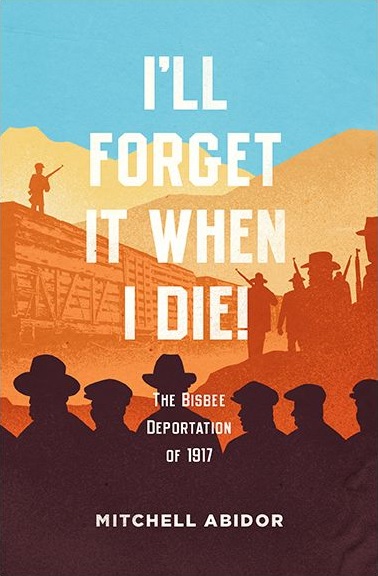
Recently, Industrial Worker spoke with Mitchell Abidor, author of I’ll Forget it When I Die!, a new history of the Bisbee Deportation of 1917, during which 12,000 striking miners and their supporters were exiled to the New Mexican desert by the combined forces of the mining companies and local law enforcement. Abidor discussed the importance of keeping alive the memory of early US labor struggles such as Bisbee, the role of the Industrial Workers of the World in the great strikes of the 20th century, and inspiration for unionizing workers today. The interview below has been edited for clarity and length.
Industrial Worker: Why do you think the Bisbee Deportation is important to remember?
Mitchell Abidor: There was a particular moment in the middle of the Trump years that this kind of insane cruelty struck me as being important. There was all this hooey about, “This isn’t us, this isn’t America.” It makes me angry every time I hear that, because that is America. I was demonstrating against the Vietnam War from the time I was a teenager, so I’ve never had any illusions about America. I knew that America is not a country that accepts dissent, that America is willing to crush people who dissent. So the Bisbee Deportation seemed, during the Trump era, to be a subject that was extremely relevant.
These strikes became a moment of widespread regional solidarity. How did the IWW support that?
The IWW intentionally regionalized everything. The mining towns of Butte and Bisbee, with 900 miles of farm between them, were all part of the same struggle. The IWW could do that because it had that kind of breadth. There’s no way it could have been done otherwise, because no one else was interested. For example: The IWW established a Spanish-language newspaper in Bisbee for Mexican workers. There’s no other union at the time that would have done that.
The IWW were the only ones who were fighting. Regardless of whether people were interested in the “One Big Union” or other overarching IWW ideas, what they admired was the union’s willingness to fight. In areas like the West, among the miners and the people in the timber fields, this was really important, because nobody else was willing.
What is one thing that you think union members today should internalize from this story?
History gets buried. There are places in our own history that we could take inspiration from — specifically, that you can bring together people from different nationalities, who don’t speak the same language, but who all share the same enemy. It’s not impossible for people who share a common enemy to fight together.
